The civil war in Syria is no longer in the news headlines, but there are still around 5 million Syrians displaced from their homeland.
We photographed Syrian refugees in Za'atari refugee camp in Jordan and interviewed them about the objects they took and the circumstances of their journey. The exhibition 'A piece of Syria' tells ten short stories from Syrian refugees told through cherished possessions they took on their journey.
The photos and interviews were done in close cooperation with
Save the Children Jordan.
Because of the coronavirus safety measures, the exhibition is no longer accessible to the public. Therefore, the exhibition will be visible on the page below until June 1, 2020.

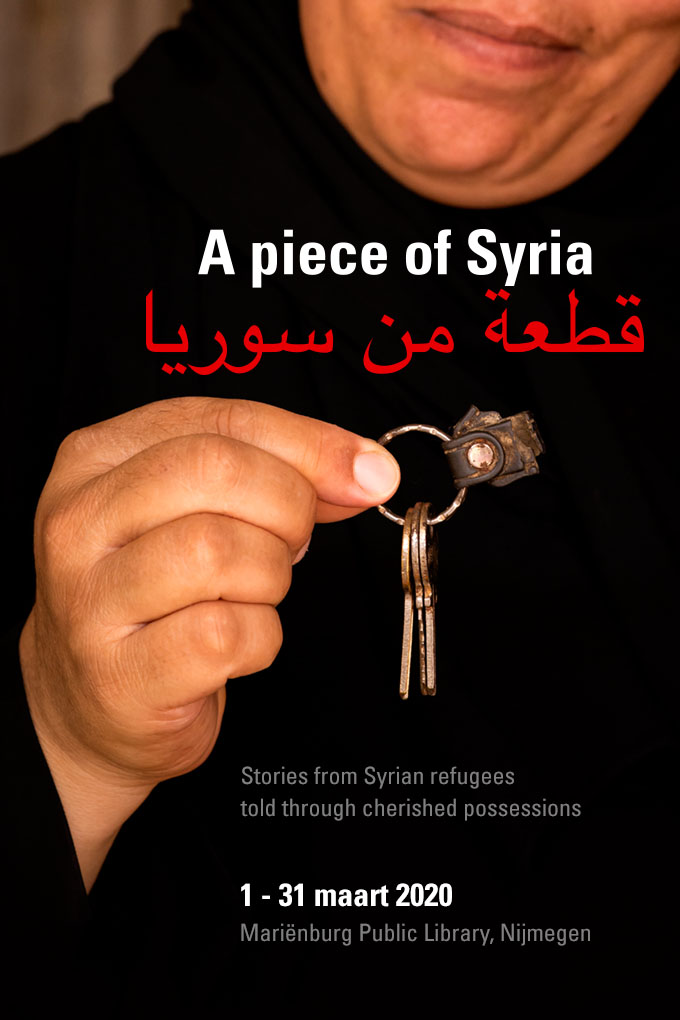

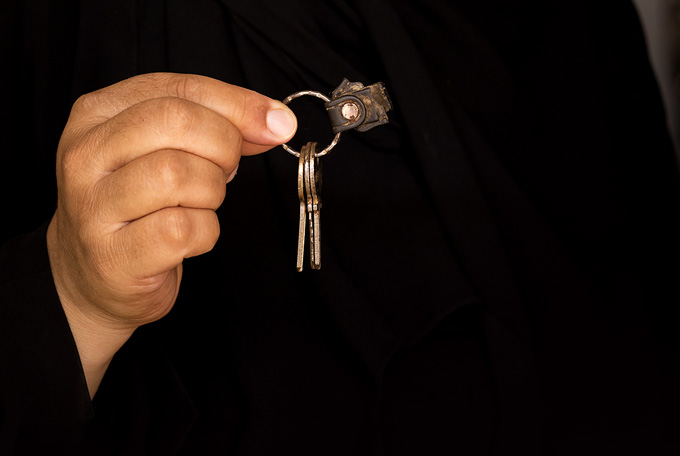

Raneem fled Syria with her family, her sisters family and a nephew. She and her two daughters have lived in Za'atari since 2014. Her husband passed away at the beginning of the war. Her daughter's husband is still in prison in Syria and his fate in not clear.
“We had been under siege for more than 10 days and were cut off from food, water and medicine. In our street there was heavy fighting by the government army and the rebels. Suddenly a bullet pierced our window, barely missing the head of one of my children. Just after Asr (afternoon prayer), when there was a short break in the fighting, we fled. We walked from village to village in the direction of Jordan. I had never heard of Za'atari until my son mentioned it.
My husband always had a medal on his keyring. We lost the medal, but we still have the keyring. The fighting came closer and closer, but we had prepared to flee and had our suitcases packed. I closed the door to our house and we left. On our wall, we now have two sets of keys: one for our caravan here and one from our home in Syria.”

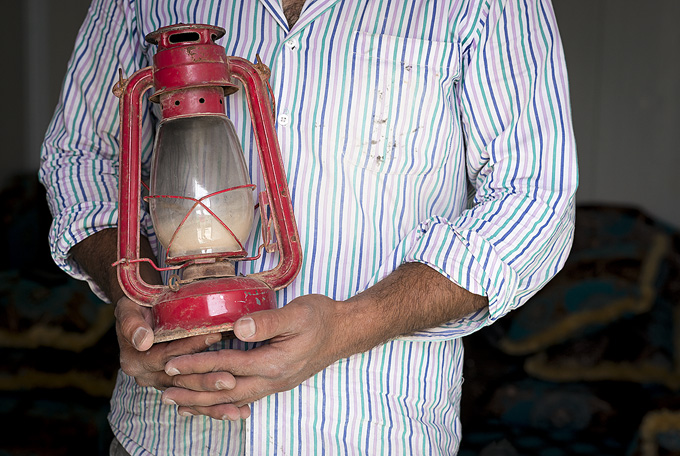

Osama originally is from Aleppo, but fled from Dara'a to Za'atari refugee camp in 2013. He arrived with his two wives, his six children and his mother. He is a brickmaker, a profession he also had when he was in Syria.
“I had almost finished military service, but because of the war I had to stay in the army longer. I lived in Dara's with my wives, my mother and my children. We had been living there for seven months when the Syrian army and the rebels started kiling each other with guns and knives. I had to hide, because I was on leave. The city was surrounded. Before I fled, rockets were shot at the city and my children were very afraid.
When we fled, I only took a few things: a water can, a teapot, pen and paper and my passport. But also this oil lamp. I've had it since I was a child, it used to below to my father. It burns paraffin and still works. I had heard that there was no electricity in the refugees camp. My children are afraid in the dark, so I took this lamp to comfort them in the night.”

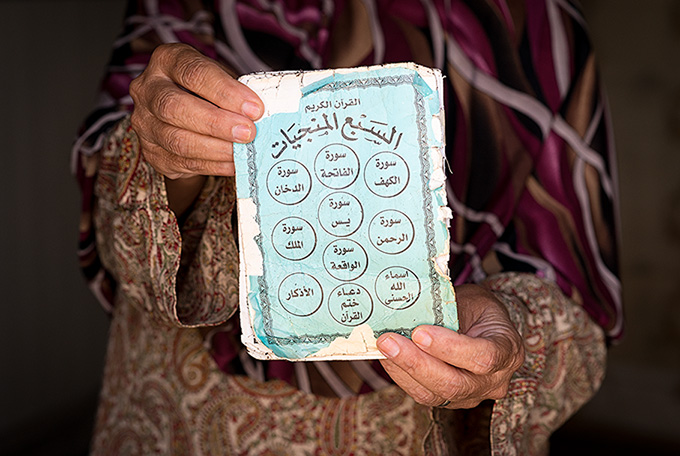

Layan fled together with her daughter and daughter in law. They have been in Za'atari refugees camp since 2013. Her husband is still in prison in Syria. Her son lives in Lebanon. Layan works as a social worker in Za'atari.
“We had just prepared lunch and wanted to start eating. Then, heavy fighting started between the government army and the rebels. The streets were filled with chaos and we decided to flee. We traveled from village to village and every once in a while we returned to our village when it was safe. The last time, we were not allowed back to our village, because the army had closed it off. I am here with daughter and daughter in law. My son is in Lebanon, but he is not allowed to visit anymore. I haven't seen him for over a year.
I did not have time to pack anytime for our journey, I could only take the clothes I was wearing and this booklet with Quran verses. It is about protection against danger. I was reading it at home when the bombing started. I often read it during our flight from Syria. Here in Za'atari, I do a lot of volunteer work. I try to make people happy.”

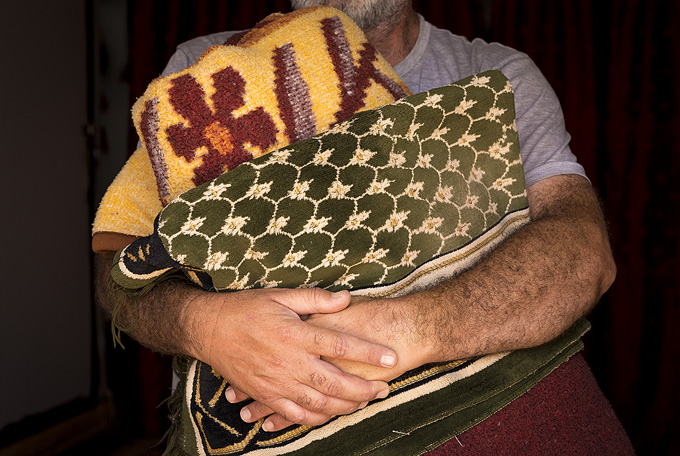

Husam fled with his wife, their three daughters and two sons. Two of his daughters went back to Syria and live there with their husbands.
“We heard that the army wanted to attack our city, so we started to collect our precious belongings. When we heard that the army wanted to draft our sons, we decided to flee to Jordan. We traveled from village to village and moved on when it became unsafe again. Sometimes we had to hurry and sometimes we had more time to prepare our journey.
I gave these blankets to my parents as a gift once and got them back when I got married. My father used to use them for protection, they still smells like him. We have all been covered by these blankets. After my father died, they protected my mother and now they protect me and my children. Of course I will take them back to Syria with me when we go back, unless God takes me before I am able to return.”

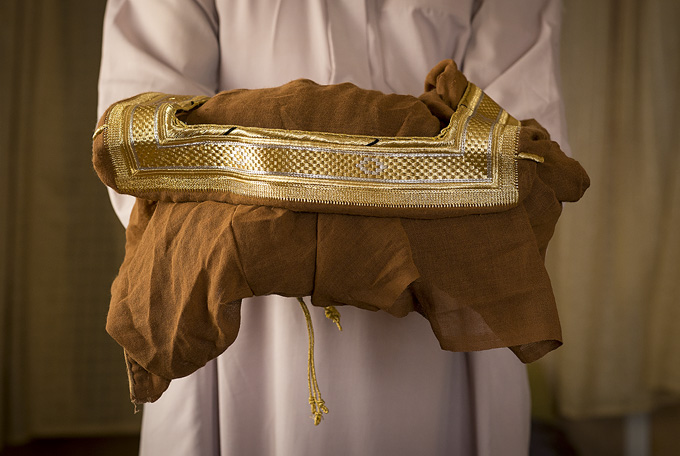

Mohammed came to Za'atari refugee camp with his two sons and a daughter. He has 14 grandchildren and two of them live with him in the camp. The others live in various countries in Europe and in the Middle East.
“I used to be a farmer and had a farm 1000 acres of land and a well. I did not trust the government army, nor the rebels. We had to flee suddenly: someone put a Kalishnikov to my head and said I had to leave.
I am one of nine brothers. Normally, this thawb (a piece of clothing for special occassions) is given to the eldest son. My oldest brother is a judge. I am only a farmer, but still my father gave it to me. In these times, here in Za'atari, I have no reason to wear it. I will only wear it when I am back in Syria.”

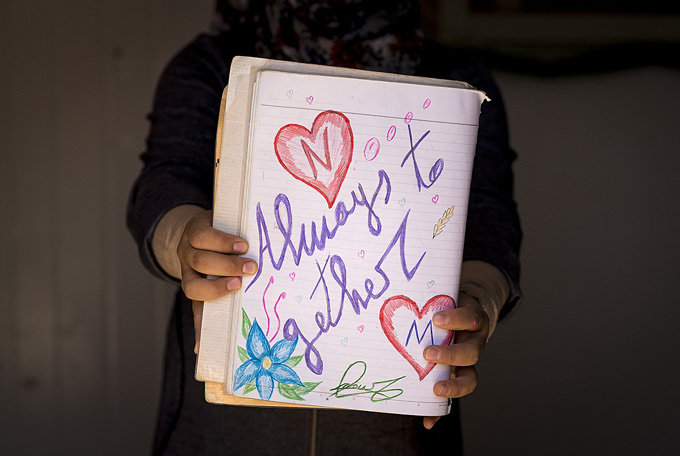

Nada is from a large family (12 sisters and 2 brothers) and has lived in Za'atari refugee camp since 2013. Eight of her brothers and sisters also live in Za'atari. She and five of her sisters got married in Za'atari.
“We left our house in Syria in 2011 and for about two years we traveled from village to village. We fled just before the fighting started in full and therefore, we were a bit better off than some other families that we fleeing. Sometimes we stayed in tents, sometimes in house of which the owners had fled also.
This book used to belong to my sister, she used it to practise her maths in it. I tore out the pages with maths. At the beginning of the war, when I was 16 years old, I started drawing in it. Now I am 23, and it is almost full with drawings and poems. I Syria I was in school, but I had to quit. Here in the camp, someone saw my drawings and thanks to this sketchbook, I now have a job as an arts teachers in one of the daycare centers here.”

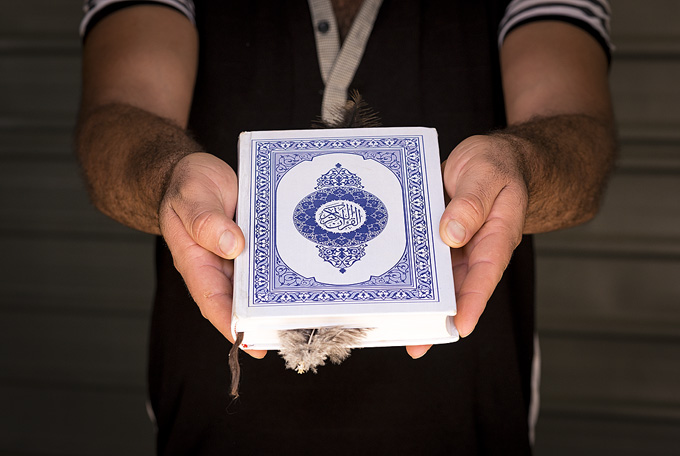

Ahmad fled with his wife and their ten months old baby. After a few months, his mother followed. He now has two children and the third in one the way. Since 2012, they live in Za'atari refugee camp. In Syria he worked in the dutyfree zone. In Za'atari, he has been unable to find work.
“We are all from Dara'a. Just before we left Syria, there was shooting almost every day. It was difficult to travel to my work in Damascus because of all the road blocks and checkpoints. Eventually, I lost my job and by car and on foot we fled to Za'atari.
This Quran helps me relax and forget about the bad things in my life. Reading the Quran protects me and helps my strenghten my faith. I took it with me from Syria and take it with me wherever I go.”

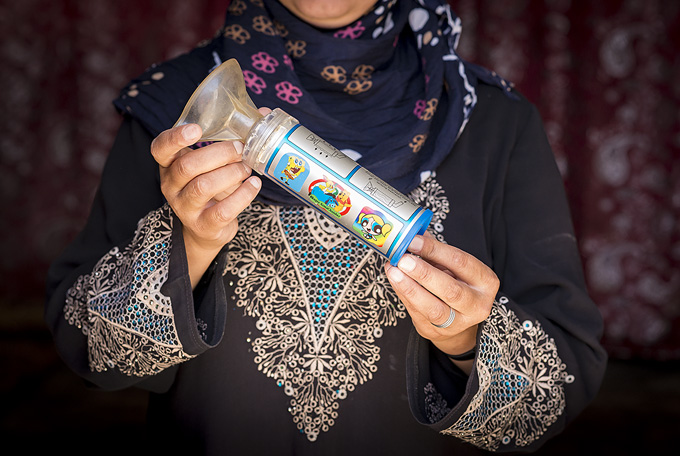

Mays fled Syria with her two sons. Her husband died before the war. They've lived in Za'atari refugee camp since 2012.
“The night before we fled there was incessant bombing. My children were so afraid that they hid under the table. After Fajr, the morning prayer, we decided to flee. We traveled from village to village in Syria. Eventually we arrived by car in Za'atari.
My son Ahmad has asthma. This inhaler was the first thing I put in the suitcase that was ready for our journey. Ahmad was 10 when we came here. Now, he is almost 17. Sometime he still uses it, but here in Za'atari he has a device that runs on electricity.”

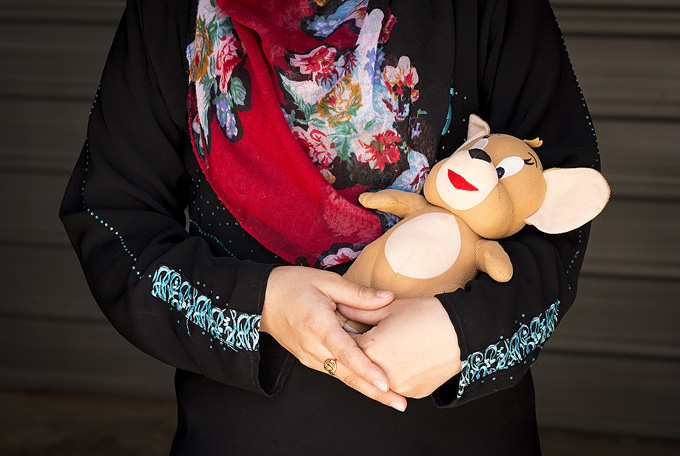

Ghadeer fled with her husband and their ten months old daughter. She now has two children and is pregnant from her third. Her family has lived in Za'atari refugee camp since 2012. She works as a kindergarten teacher.
“We fled Syria in the night, during the day it was too dangerous because of the shooting. We traveled from village to village by foot or by car. Sometimes, people shot as us as we were fleeing. I remember quite a few things of Syria, but my daughter who is 7 now, has no memories of Syria.
We had to flee in a hurry and this teddybear was next to me. I've had it since I was little. I gave it to my daughter and she immediately grabbed it. Some people gave their children sleeping pills to stop them from crying and making noise. I did not want that, so I comforted my daughter with this teddybear.”

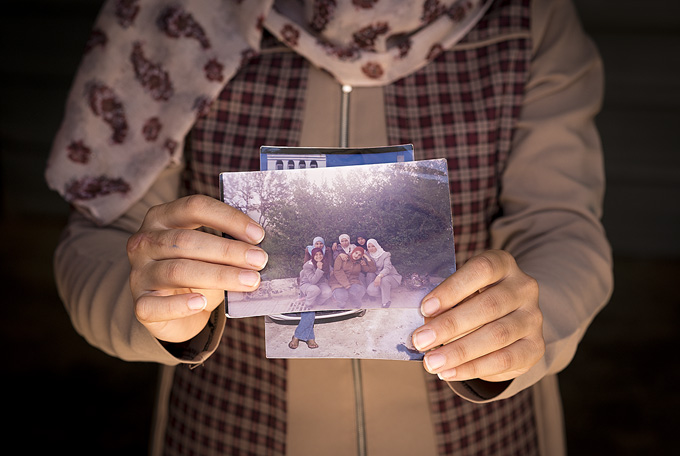

Rana is from a small village in south Syria. She fled from the city of Dara's, where her husband had a phone repair shop. She arrived in Za'atari refugee camp with her husband, her son and her daughter. In Za'atari, she had two more daughters.
“My husband was one a government list of wanted persons. Therefore, our life in Syria became very difficult. One night, there was bombing very close to our home and I fled with a husband, my two children and my husbands parents.
I took these photos because they have a very special place in my heart. They are memories of the good times, together with my school friends. I have not seen them since we left Syria. One of them is in Dubai and the rest is still in Syria.”